walnut oil
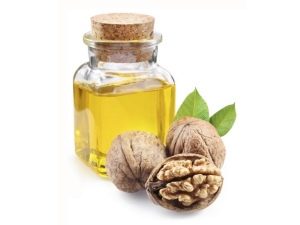
Walnuts used to make oil. It is a valuable plant product and is widely used by people in various fields, from cooking and medicine to cosmetology. Walnut oil has many useful and medicinal properties.
Preparation method
Nuts taken from trees should lie down for several months to finally ripen. During this time, the oil content in them increases. Whereas in fresh fruits there is more milky juice, which enters the oil during pressing. However, it is also not worth storing nuts for a long time, otherwise the oil in them will go rancid.
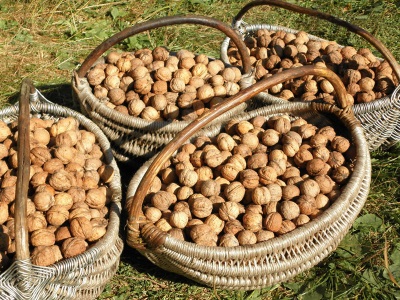
To make butter, the nuts are broken and separated from the shell. The fruit kernels are crushed and sent for pressing. The first pressing takes place in the cold. After it, the cake is crushed again, mixed with warm water and pressed again (sometimes heated). The first pressing gives a yield of about 30-35 percent of the oil, the second - about 10-15 percent.
How to choose and where to buy
You can buy such vegetable oil in large stores and specialized outlets selling health products. Oils can also be ordered online. You can find this oil in both plastic and glass containers.
There is an opinion that walnut oil in a glass bottle retains better both aroma and taste, and valuable useful qualities.
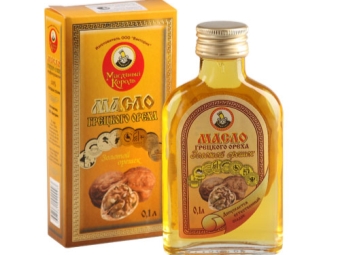
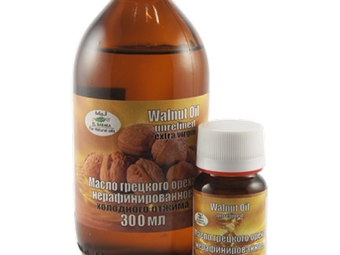
When choosing oil from walnuts, consider the following points:
- Natural oil has a pleasant mild nutty taste, light aroma, yellow-golden hue.
- In order not to purchase a fake, pay attention to the price - if it is greatly underestimated (2-3 times), there is a high probability that you have a diluted product.
- The consistency of the oil should be sufficiently thick and viscous.
- Twist the bottle in your hands and tilt it - greasy traces should remain on the walls.
- Also, naturalness can be judged by the presence of sediment at the bottom if you buy an unrefined product.
Characteristics
- The first pressing oil has a pleasant taste. It is colorless or has a slight greenish tinge.
- The oil obtained by pressing with heating has a more intense color. Its taste is worse than that of a product pressed at ordinary temperature.
- The density of nut butter is 0.925-0.927.
- The product hardens at minus 18-28 degrees.
- The oil dries easily and becomes rancid when stored for a long time.
- The taste of edible nut oil is superior to olive oil.
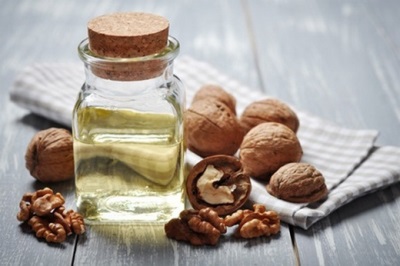
Nutritional value and calories
100 g of nut butter contains:
| Squirrels | Fats | Carbohydrates | calories |
| 0 grams | 100g | 0 grams | 884 kcal |
Chemical composition
The composition of the oil extracted from the walnut contains:
- valuable fatty acids, among which there are many such polyunsaturated acids as linolenic, oleic, linoleic and others;
- carotenoids, retinol;
- vitamins K, PP, group B;
- iron, iodine, copper and other macro and microelements;
- coenzyme Q10.
This oil is extremely rich in vitamin E, as well as omega-6 and omega-3 fatty acids. This makes it a useful food product. This oil is especially recommended during pregnancy, since it not only provides useful substances, but also prevents toxicosis.
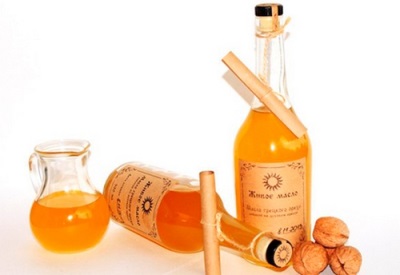
Beneficial features
The unique composition of walnut fruit oil makes it a valuable product for culinary, cosmetic and medicinal use.
By taking this product regularly, you:
- rejuvenate the body;
- increase vitality;
- strengthen the vessels;
- remove radionuclides from the body;
- improve complexion;
- normalize sleep;
- reduce cholesterol levels;
- strengthen the protective function of the body.
Thanks to plant enzymes that increase blood flow in the genital area, the oil acts as an aphrodisiac. It also has a stimulating effect on the formation of spermatozoa.
Watch videos on the topic.
Harm and contraindications
There are practically no complete contraindications to nut oil, except for individual intolerance to nuts and allergies to them, but the volume and frequency of use of this useful product must be controlled when:
- ulcerative lesions of the gastrointestinal tract;
- exacerbation of gastritis with reduced acidity;
- severe liver disease;
- breastfeeding (oil can cause allergies in the baby).
You can not use nut oil with high fever, nausea, vomiting attacks.
How to use
Walnut oil can be added to different dishes (preferably cold, without heating). It is also recommended to use this oil on an empty stomach up to three times a day for a teaspoon (half an hour before meals).
Walnut oil is recommended for children after 1 year. The product can be added up to 5 ml. per day in salads and cereals.For children older than 5 years, the dosage is increased to 10-15 ml. in a day.
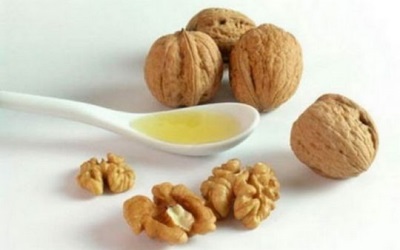
Application
In cooking
In our country, this type of oil is rarely used in cooking, but oriental and Mediterranean dishes are often cooked with nut oil.
Butter from nuts you can:
- add to vegetable salads to improve and complement their taste;
- use for frying meat;
- make a component of cold sauces;
- add to homemade cakes (dough for cake, pie, etc.).
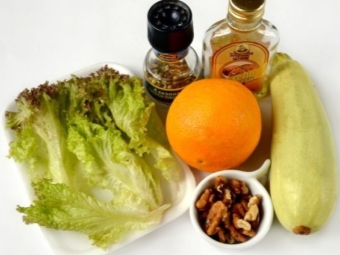
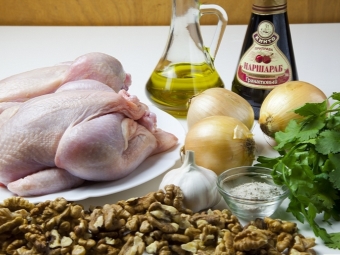
Watch the video recipe for an unusual dish, which includes walnut oil.
In medicine
Walnut oil is recommended for:
- Tuberculosis
- Inflammation of the mucous membranes
- Chronic colitis
- Oncological diseases
- constipation
- Hyperthyroidism
- urolithiasis
- Varicose veins
- Otite
- chronic arthritis
- Peptic ulcer and hron. gastritis with high acidity
- Diabetes
- Metabolic disorders
- Cuts, inflammations, burns and wounds on the skin
If a person has a predisposition and risk of developing diseases of the liver, blood vessels and heart, it is advised to use this oil as a prophylactic. The drug should also be taken during recovery after a serious illness or operation.
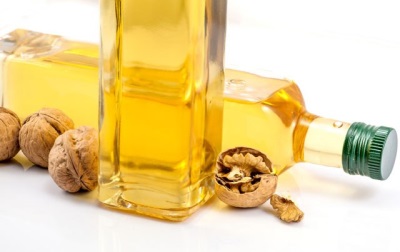
Oil can be used:
- outwardly - rub into the skin, diseased joints, lubricate diseased veins;
- inside - half a spoonful in the morning (especially with high blood pressure and cholesterol, combined with a spoonful of honey) or at night (especially with colitis, constipation, hepatitis and tuberculosis).
When losing weight
People seeking to lose weight will appreciate nut butter, because it is a wonderful source of many nutrients and energy. The oil is highly digestible and can be included in any healthy diet.
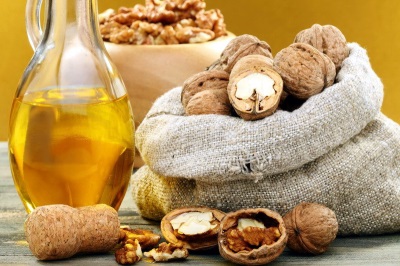
At home
- Used in the preparation of printing inks.
- Used in soap making.
- The cake is fed to livestock.
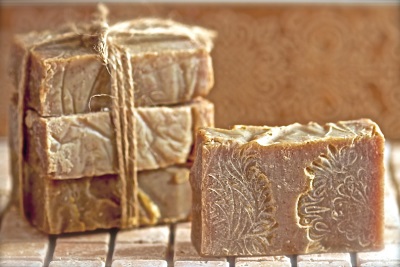
In cosmetology
The rich vitamin and microelement composition made the nut. oil in demand in cosmetology.
Namely:
- This oil can be used on all skin types, but works best on dry, irritated and sensitive skin as it cools, soothes and moisturizes.
- Walnut oil is a component of many cosmetics - balms, hygiene products, creams and others.
- When using the oil in its pure form, it is distributed over the skin evenly and easily, and is also quickly absorbed.
- Thanks to the use of this oil, you can get rid of cracks on the lips, as well as on the skin of the body.
- The presence of a regenerating and rejuvenating effect allows the use of this oil in the fight against age-related changes in the skin (it eliminates fine wrinkles).
- Regular application of walnut oil on the body tightens the skin, improves its elasticity and provides smoothness.
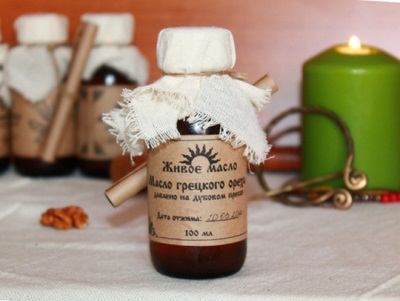
As well as:
- When caring for skin with nut oil, it is often mixed with another type of oil, such as olive or almond. This mixture is recommended to be applied to the body after a shower.
- With walnut oil, you can massage by adding various aroma oils to it, as in a base oil.
- Mixing walnut. oil (two tablespoons) with juice (a few drops) and oil (tablespoon) of lemon, it is recommended to make masks to strengthen nails. The mixture is rubbed into the nails and washed off after 20 minutes. Applying this mask, you will make the nail plates even, hard, lighten them a little and be able to prevent delamination.
- By adding fatty sour cream to walnut oil, you can cope with dry skin of the hands, and by mixing the oil with mashed potatoes, they make hand masks that help eliminate age-related pigmentation.
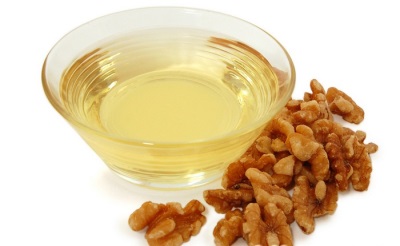
For hair
Nut oil is often used to strengthen the hair.
It is recommended not only to include in the diet, add to shampoo or balm, but also to use for the preparation of masks.
An example of a homemade mask for stimulating the blood flow of the scalp, additional nutrition and hair strength, as well as pliability in styling, is a recipe with honey and an egg. For the mask you need to take two tables. tablespoons of nut oil, tea. a spoonful of honey and one egg, which is pre-beaten. The ingredients are mixed and rubbed into the scalp and hair. Next, you need to wrap your head with a towel and keep the mask for half an hour, then wash your hair with regular shampoo.
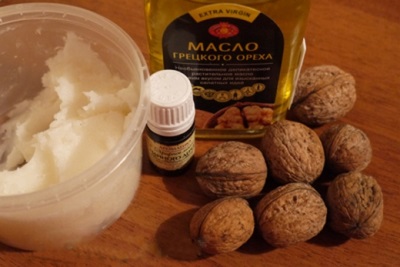
For face
By adding a few drops of walnut oil to a night or day cream, you will enrich your cosmetics with useful substances and can use it as a rejuvenating agent.
To prepare masks for nut butter, you can add:
- A little bit of cosmetic clay and lemon aroma oil (three drops). Keep on the face for twenty minutes. This mask is recommended for oily and combination skin.
- In the same amount, sea buckthorn and cedar oil. Apply for 15 minutes. This mask is especially suitable for those with dry skin.
- An infusion of chamomile flowers and a little colorless henna. Keep it on your face for ten minutes. This recipe is suitable for all skin types. This mask has an anti-inflammatory effect.
Walnut oil can be applied to lips if they are flaky, dry or chapped. You can treat your lips with this fragrant product before a walk in the cold.
With problem skin and the presence of inflammation, damage, disease and irritation, the affected areas should be lubricated with walnut oil twice a day.
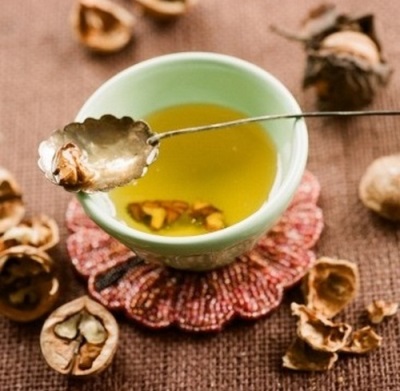
For Tan
By eating walnut oil, you will protect the skin from the inside when you get a tan, activating its protective function (this way you protect yourself from burning). The oil can also be applied to the skin like any other tanning oil. In addition, it is believed that this vegetable oil effectively maintains and preserves an existing tan. With it, your skin will be bronzed and attractive for longer.

Interesting Facts
- When falsifying walnut oil, linseed oil is added to it.
- In Persia, walnut oil was considered a product that promotes mental development.
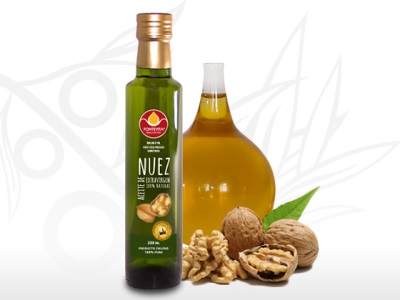


















It is great to add walnut oil to vegetable salads. Very useful + unusual aroma is obtained.